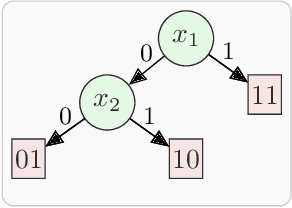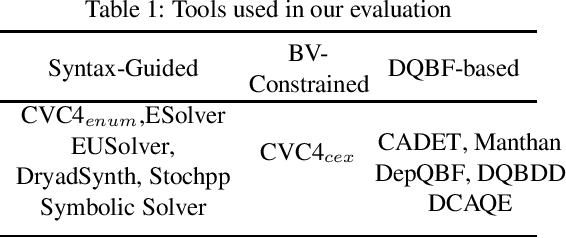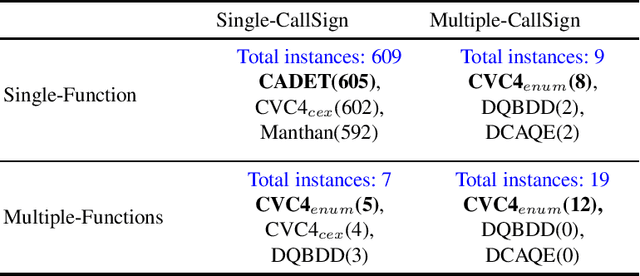Priyanka Golia
Synthesis with Explicit Dependencies
Jan 25, 2023



Abstract:Quantified Boolean Formulas (QBF) extend propositional logic with quantification $\forall, \exists$. In QBF, an existentially quantified variable is allowed to depend on all universally quantified variables in its scope. Dependency Quantified Boolean Formulas (DQBF) restrict the dependencies of existentially quantified variables. In DQBF, existentially quantified variables have explicit dependencies on a subset of universally quantified variables called Henkin dependencies. Given a Boolean specification between the set of inputs and outputs, the problem of Henkin synthesis is to synthesize each output variable as a function of its Henkin dependencies such that the specification is met. Henkin synthesis has wide-ranging applications, including verification of partial circuits, controller synthesis, and circuit realizability. This work proposes a data-driven approach for Henkin synthesis called Manthan3. On an extensive evaluation of over 563 instances arising from past DQBF solving competitions, we demonstrate that Manthan3 is competitive with state-of-the-art tools. Furthermore, Manthan3 could synthesize Henkin functions for 26 benchmarks for which none of the state-of-the-art techniques could synthesize.
Engineering an Efficient Boolean Functional Synthesis Engine
Aug 12, 2021



Abstract:Given a Boolean specification between a set of inputs and outputs, the problem of Boolean functional synthesis is to synthesise each output as a function of inputs such that the specification is met. Although the past few years have witnessed intense algorithmic development, accomplishing scalability remains the holy grail. The state-of-the-art approach combines machine learning and automated reasoning to efficiently synthesise Boolean functions. In this paper, we propose four algorithmic improvements for a data-driven framework for functional synthesis: using a dependency-driven multi-classifier to learn candidate function, extracting uniquely defined functions by interpolation, variables retention, and using lexicographic MaxSAT to repair candidates. We implement these improvements in the state-of-the-art framework, called Manthan. The proposed framework is called Manthan2. Manthan2 shows significantly improved runtime performance compared to Manthan. In an extensive experimental evaluation on 609 benchmarks, Manthan2 is able to synthesise a Boolean function vector for 509 instances compared to 356 instances solved by Manthan--- an increment of 153 instances over the state-of-the-art. To put this into perspective, Manthan improved on the prior state-of-the-art by only 76 instances.
Program Synthesis as Dependency Quantified Formula Modulo Theory
May 19, 2021



Abstract:Given a specification $\varphi(X,Y)$ over inputs $X$ and output $Y$, defined over a background theory $\mathbb{T}$, the problem of program synthesis is to design a program $f$ such that $Y=f(X)$ satisfies the specification $\varphi$. Over the past decade, syntax-guided synthesis (SyGuS) has emerged as a dominant approach for program synthesis where in addition to the specification $\varphi$, the end-user also specifies a grammar $L$ to aid the underlying synthesis engine. This paper investigates the feasibility of synthesis techniques without grammar, a sub-class defined as $\mathbb{T}$-constrained synthesis. We show that $\mathbb{T}$-constrained synthesis can be reduced to DQF($\mathbb{T}$), i.e., to the problem of finding a witness of a Dependency Quantified Formula Modulo Theory. When the underlying theory is the theory of bitvectors, the corresponding DQF(BV) problem can be further reduced to Dependency Quantified Boolean Formulas (DQBF). We rely on the progress in DQBF solving to design DQBF-based synthesizers that outperform the domain-specific program synthesis techniques, thereby positioning DQBF as a core representation language for program synthesis. Our empirical analysis shows that $\mathbb{T}$-constrained synthesis can achieve significantly better performance than syntax-guided approaches. Furthermore, the general-purpose DQBF solvers perform on par with domain-specific synthesis techniques.
Manthan: A Data Driven Approach for Boolean Function Synthesis
May 14, 2020



Abstract:Boolean functional synthesis is a fundamental problem in computer science with wide-ranging applications and has witnessed a surge of interest resulting in progressively improved techniques over the past decade. Despite intense algorithmic development, a large number of problems remain beyond the reach of the state of the art techniques. Motivated by the progress in machine learning, we propose Manthan, a novel data-driven approach to Boolean functional synthesis. Manthan views functional synthesis as a classification problem, relying on advances in constrained sampling for data generation, and advances in automated reasoning for a novel proof-guided refinement and provable verification. On an extensive and rigorous evaluation over 609 benchmarks, we demonstrate that Manthan significantly improves upon the current state of the art, solving 356 benchmarks in comparison to 280, which is the most solved by a state of the art technique; thereby, we demonstrate an increase of 76 benchmarks over the current state of the art. Furthermore, Manthan solves 60 benchmarks that none of the current state of the art techniques could solve. The significant performance improvements, along with our detailed analysis, highlights several interesting avenues of future work at the intersection of machine learning, constrained sampling, and automated reasoning.
 Add to Chrome
Add to Chrome Add to Firefox
Add to Firefox Add to Edge
Add to Edge